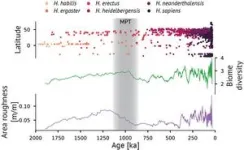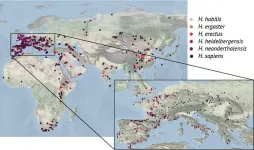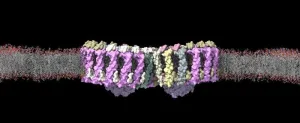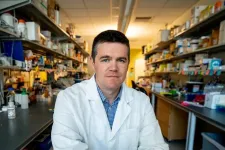(Press-News.org) A new study from Karolinska Institutet, published in Science Translational Medicine, shows that people with type 2 diabetes have lower levels of the protein that breaks down and converts creatine in the muscles. This leads to impaired function of the mitochondria, the 'powerhouses' of the cell.
Creatine is a natural compound in the body that is also found in foods such as meat and fish. It is also a popular supplement for improving exercise performance as it can make muscles work harder and longer before they become fatigued. Despite creatine's recognized positive effects, previous studies have suggested a possible link between high blood creatine levels and an increased risk of type 2 diabetes. This has raised questions about whether creatine supplementation may contribute to that risk.
New research based on studies in both humans and mice shows that people with type 2 diabetes have lower protein levels in their muscles that metabolises and converts creatine - a protein called creatine kinase.
“This reduced protein level leads to impaired creatine metabolism in the muscle. This may explain why people with type 2 diabetes accumulate creatine in their blood,” says Anna Krook, Professor at the Department of Physiology and Pharmacology at Karolinska Institutet and the study's principal investigator.
Scientists don't know exactly what high creatine levels in the blood mean for the body, but it is known that it does have an effect outside the cells.
“The findings indicate that impaired creatine metabolism is a consequence of type 2 diabetes, rather than a cause of the disease,” says Anna Krook.
The study also shows that low levels of creatine kinase are not only linked to higher creatine levels in the blood, but also impair the function of mitochondria in the muscle. Mitochondria, which convert nutrients into energy, function less well in muscle cells with reduced creatine kinase, leading to both lower energy production and increased cell stress.
“This is quite consistent with the fact that people with type 2 diabetes have poorer energy metabolism. In the future, one possibility could be to regulate creatine kinase as part of the treatment of metabolic diseases such as obesity and diabetes,” says Anna Krook.
An unexpected finding of the study was that changes in creatine kinase levels affected the appearance of mitochondria and also their ability to produce energy, regardless of the amount of creatine available.
“This suggests that although the main role of creatine kinase is to process creatine, it affects mitochondrial function in other ways,” explains David Rizo-Roca, the study's first author.
“Our next step is to find the molecular mechanisms behind these effects,” he says.
The study partners are Danderyd Hospital and Karolinska University Hospital Huddinge. The main funders are the European Association for the Study of Diabetes (EASD), the Knut and Alice Wallenberg Foundation, the Swedish Research Council for Health, Working Life and Welfare, the Diabetes Foundation and the Novo Nordisk Foundation. The researchers declare that there are no conflicts of interest.
Publication: “Decreased mitochondrial creatine kinase 2 impairs skeletal muscle mitochondrial function independently of insulin in type 2 diabetes”, David Rizo-Roca, Dimitrius Santiago PSF Guimarães, Logan A Pendergrast, Nicolas Di Leo, Alexander V Chibalin, Salwan Maqdasy, Mikael Rydén, Erik Näslund, Juleen R Zierath, Anna Krook, Science Translational Medicine, online October 9, 2024, doi: 10.1126/scitranslmed.ado3022
END
New study shows how muscle energy production is impaired in type 2 diabetes
2024-10-09
ELSE PRESS RELEASES FROM THIS DATE:
Early human species benefited from food diversity in steep mountainous terrain
2024-10-09
A new study published in the journal Science Advances [1] by researchers at the IBS Center for Climate Physics (ICCP) at Pusan National University in South Korea shows that the patchwork of different ecosystems found in mountainous regions played a key role in the evolution of humans.
A notable feature of the archeological sites of early humans, members of the genus Homo known as hominins, is that they are often found in and near mountain regions. Using an extensive dataset of hominin fossils and artifacts, along with high-resolution landscape data and a 3-million-year-long simulation of Earth’s climate, the team of scientists from ICCP have provided a clearer picture of how ...
Researchers discover new insights into bacterial photosynthesis
2024-10-09
Researchers at the University of Liverpool and collaborators have discovered new understanding of bacterial photosynthesis.
Using cutting-edge techniques, investigators have unveiled intricate detailed images of the key photosynthetic protein complexes of purple bacteria. These images shed new light on how these microorganisms harness solar energy.
The study, published today, not only advances scientists’ understanding of bacterial photosynthesis but also has potential applications in the development of artificial photosynthetic systems for clean energy production.
Like plants, many ...
Former United States Air Force surgeon general to lead Military Health Institute at UT Health San Antonio
2024-10-09
The University of Texas Health Science Center at San Antonio (UT Health San Antonio) announces the appointment of retired Lt. Gen. Robert Miller, MD, MBA, MSS, FAAP, FACHE, FACPE, as the new Executive Director of the Military Health Institute at UT Health San Antonio. Miller will assume his role, effective October 15.
Miller joins UT Health San Antonio with more than 30 years of service in the United States Air Force, where he held several top leadership roles. Throughout his distinguished career, Miller served as command surgeon, director of education ...
Journal of Nutrition Education and Behavior announces 2024 Best Article, Best Research Brief, and GEM Awards
2024-10-09
Philadelphia, October 9, 2024 – The Journal of Nutrition Education and Behavior (JNEB) is pleased to announce the 2024 Best Article, Best Research Brief, and GEM (Great Educational Material) awards. These awards were presented at the Society for Nutrition Education and Behavior's (SNEB) 2024 International Conference, held July 29 – August 1 in Knoxville, TN, and hosted online. These awards recognize the authors of the outstanding articles in each category published in the prior year in JNEB, as judged by members of the ...
NYU Tandon School of Engineering study maps pedestrian crosswalks across entire cities, helping improve road safety and increase walkability
2024-10-09
As pedestrian fatalities in the United States reach a 40-year high, a novel approach to measuring crosswalk lengths across entire cities could provide urban planners with crucial data to improve safety interventions.
NYU Tandon School of Engineering researchers Marcel Moran and Debra F. Laefer published the first comprehensive, city-wide analysis of crosswalk distances in the Journal of the American Planning Association. Moran is an Urban Science Faculty Fellow at the Center for Urban Science + Progress (CUSP), and Laefer is a Professor of Civil and Urban Engineering and CUSP faculty member.
"In general, lots of important data related ...
Louis V. Gerstner, Jr. family donates $25 million to establish Gerstner Scholars Program in AI Translation at Mayo Clinic
2024-10-09
ROCHESTER, Minn. — A $25 million gift from the Louis V. Gerstner, Jr. family will establish the Gerstner Scholars Program in AI Translation at Mayo Clinic. Through this program, junior and early-career clinicians and clinician-investigators will collaborate with leading experts in artificial intelligence (AI), data science and informatics to drive breakthrough cures for patients.
“We are deeply grateful to Lou and Robin Gerstner for their long-standing friendship and support,” says Gianrico Farrugia, M.D., Mayo Clinic's president and CEO. “Lou’s remarkable generosity over many years has been instrumental in ...
UTIA entomologist elected president of SIP
2024-10-09
Juan Luis Jurat-Fuentes, professor in the Department of Entomology and Plant Pathology at the University of Tennessee Institute of Agriculture, was elected to serve as president of the Society for Invertebrate Pathology (SIP). Jurat-Fuentes officially began his appointment at the society’s 56th annual meeting, held July 28 – August 1 in Vienna, Austria.
“Being elected by the SIP members as president is humbling and a great honor. I have big shoes to fill in this role as previous SIP executive councils were led by outstanding leaders,” Jurat-Fuentes said.
Jurat-Fuentes has a long history of ...
Rice bioengineers awarded $3.4M for project to end polio
2024-10-09
HOUSTON – (Oct. 9, 2024) – Rice University bioengineer Kevin McHugh has been awarded $3.4 million from the Bill & Melinda Gates Foundation for a project to incorporate protection against poliomyelitis (polio) into the combination vaccine that protects against five common and dangerous childhood diseases.
The research could help the polio eradication effort and play an instrumental role in improving access to immunization in low-resource settings ⎯ an important part of meeting sustainable development goals and achieving equity in health ...
Effects of environmental factors on Southeast Brazil’s coastal biodiversity surpass those of ecological processes
2024-10-09
Sea surface temperature, wave energy and freshwater discharge from rivers influence the abundance and size of the marine organisms that inhabit rocky shores along the coast of Southeast Brazil more than ecological processes such as competition and predation. In areas where the water is colder, such as the Lakes Region (Região dos Lagos) in Rio de Janeiro state, marine organisms are 25%-100% larger than in areas where it is warmer, such as the coast of São Paulo state.
These are the main conclusions of a study conducted by researchers affiliated with the Federal University of São Paulo (UNIFESP) in partnership with colleagues at the State University of Northern Rio de ...
Department of Energy announces $49 million for research on foundational laboratory fusion
2024-10-09
WASHINGTON, D.C. - As the Department of Energy (DOE) continues to accelerate a clean-energy future that includes fusion technology, a total of $49 million in funding for 19 projects was announced today in the Foundational Fusion Materials, Nuclear Science, and Technology programs.
The purpose of the funding is to reorient the laboratory-based foundational and basic science research programs to better align and support the new FES program vision.
“The Fusion Nuclear Science Foundational research program, ...






